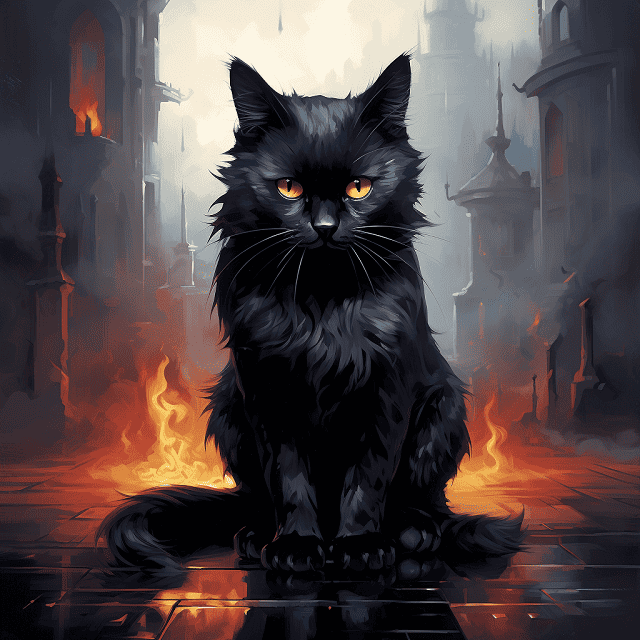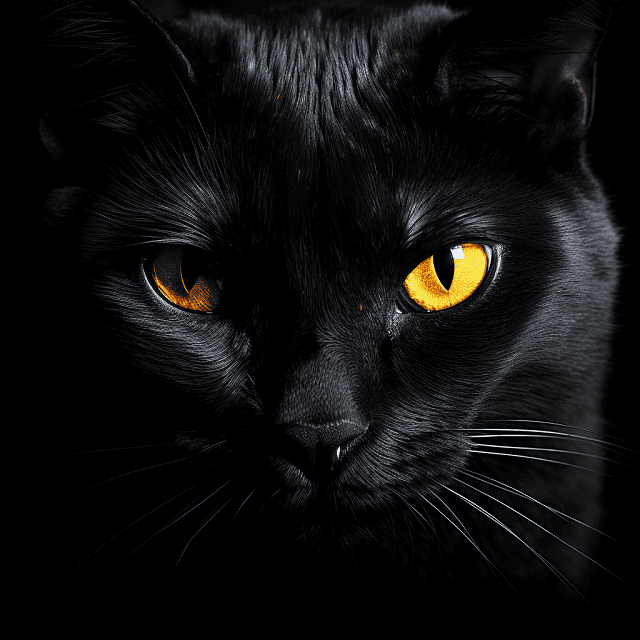Why Are Black Cats Considered Unlucky?: “Don’t let a black cat cross your path!” You’ve heard it before. But have you ever wondered why this feline breed is considered bad luck? Dive into the history, superstitions, and cultural perspectives that have influenced these beliefs. You’ll uncover how fear and misinformation can impact not just our perceptions but also adoption rates for these misunderstood creatures. Let’s debunk some myths together and shed light on the truth about black cats.
Historical Origins of the Black Cat Myth
Let’s delve into why black cats got a bad rap in history, shall we? The dark reputation of these felines can be traced back to the Middle Ages. During this time, you’d find that superstitions ran high and fear of witchcraft was rampant. Society often linked black cats as companions or familiars to witches, stoking fears and misconceptions.
As you dig deeper into historical texts, it becomes clear that this association wasn’t baseless. In fact, during the witch trials of Europe and North America, many believed that witches could transform into black cats to escape persecution. This further tainted their image and solidified their place in folklore as omens of misfortune.
Now let’s turn our gaze towards ancient Egypt. Paradoxically, here you’ll uncover a stark contrast: Egyptians revered all cats—black or otherwise—as sacred creatures. Bastet, the Egyptian goddess of home, fertility and childbirth was often depicted as a lioness or as a woman with the head of a lioness or domestic cat.
Your understanding wouldn’t be complete without acknowledging cultural differences too. In Japanese folklore for instance, black cats are considered beneficial—believed to bring good luck rather than bad! They’re thought to ward off evil spirits and protect one’s home.
Black Cats and Superstitions Across Cultures
You’re about to delve into the various superstitions surrounding these dark-furred felines in different cultures. While they are often associated with bad luck, this isn’t universally true. Let’s unravel some of these beliefs and see how their perception varies globally.
- In Western cultures, black cats have long been connected with witchcraft and evil forces. This belief originated during medieval times when witches were feared and persecuted.
- In Scotland, it’s considered good fortune if a black cat crosses your path.
- In England, they’re thought to bring prosperity and luck, especially if one walks towards you.
- Japanese culture views black cats differently:
- They are believed to bring good luck, particularly for single women. Owning a black cat is said to attract potential suitors.
- Lastly, let’s take a look at some less common beliefs among sailors and Egyptians:
- Sailors once believed that having a ship’s cat would ensure safe voyage; the best choice being a black one as it would scare away evil spirits.
- Ancient Egyptians revered all cats, including black ones. They were seen as sacred animals associated with the goddess Bastet.
These varying cultural perspectives illustrate how context shapes our beliefs and interpretations. It’s fascinating how something as simple as fur color can lead to such diverse superstitions across cultures. So next time you see a black cat crossing your path or lounging around your house; remember that whether it brings good or bad luck might just depend on where you are in the world!

The Role of Black Cats in Witchcraft and Occult Beliefs
In witchcraft and occult beliefs, they’re often seen as mysterious companions or symbols of transformation. You’ll find black cats deeply interwoven in folklore and mythologies worldwide, thought to possess supernatural powers or bring either good fortune or misfortune.
Investigate European history, and you’ll discover that during the Middle Ages, black cats were associated with witches. They were believed to be witches’ familiars – creatures gifted by the devil to aid in their dark deeds. This association has its roots in the color symbolism where black represents mystery, death, and evil forces.
Contrastingly, if you delve into ancient Egyptian culture, you’d see a starkly different perception. The Egyptians revered all cats including black ones, associating them with Bastet – the goddess of home, fertility, and protector against evil spirits.
Take note though that not all modern pagans view black cats as sinister omens. In Wicca for instance – a contemporary pagan religion – they consider these felines as spiritual guides or protectors from negative energy.
Your grasp on cultural perspectives would benefit from understanding how historical context shapes superstitions surrounding these creatures. Western societies tend to associate black cats with bad luck due to their historical ties with witchcraft while Eastern cultures like Japan regard these felines as symbols of prosperity.
It’s fascinating how divergent cultural beliefs can paint such varied portraits about something as simple yet enigmatic as a black cat. As an observer of this phenomenon – it’s your role to analyze these cultural nuances critically while respecting each belief system’s unique interpretation.
Psychological Factors Influencing the Fear of Black Cats
Diving into the psychological factors, it’s intriguing to see how deep-seated fears and superstitions can affect people’s perceptions of these felines. The color black itself has been associated with death, evil, and mystery in various cultures – a perception that unwittingly extends to black cats.
Your mind is a complex web of emotions, knowledge, experiences, and beliefs. Whether you realize it or not, your cultural background plays a significant role in shaping these elements. This influence becomes particularly evident when examining the fear or disdain for black cats.
- Fear of the Unknown
- Humans have an innate fear of what they cannot understand or predict. Black cats’ nocturnal nature and their ability to blend into darkness enhance this sense of mystery.
- Cultural Conditioning
- Society often conditions us to believe in certain things from a young age. Tales about witches using black cats as familiars were widespread during the Middle Ages.
- Symbolism
- Symbols are powerful tools that can evoke strong emotions within us. In literature and media, black has often been used as a symbol for negativity.
It’s essential to remember that these feelings towards black cats are learned behaviors rather than instinctual responses. They stem from centuries-old folklore and superstitions ingrained deeply into our collective consciousness over generations.
The Impact of Black Cat Stereotypes on Adoption Rates
Sadly, these deep-rooted superstitions have a significant impact on adoption rates for our ebony-furred feline friends. You may find it difficult to believe that in the 21st century, age-old beliefs still dictate our actions, but it’s true. Research shows that black cats are less likely to be adopted than their lighter-colored counterparts due to persisting stigmas associated with them.
In many Western cultures, black cats are mistakenly associated with bad luck and witchcraft. They’re often seen as harbingers of misfortune, influencing your decision when you’re considering adopting a pet. It’s not just hearsay; statistics back this up too. Animal shelters report lower adoption rates for black felines compared to other colors.
From a cultural perspective, this bias isn’t universal though. In some regions like Japan or Britain, black cats symbolize good luck! However, globally speaking these positive associations are outnumbered by negative ones.
Here’s what you should consider: stereotypes don’t define an animal’s behavior or personality. Just because a cat has dark fur doesn’t mean it’ll bring you ill fortune. Each cat is unique and deserves love regardless of its color.
The consequence of these prejudices is serious; more black cats end up homeless or euthanized due to lack of adoption opportunities. So next time you’re at the shelter ready to adopt a new pet, look beyond their coat color and give one of these misunderstood creatures a chance.
Remember: superstitions aren’t based on facts but rather irrational fears and beliefs from centuries ago that have no place in today’s enlightened society.

Debunking Myths: The Truth About Black Cats
Let’s debunk some myths and reveal the truth about these so-called unlucky felines. You’ve likely heard that black cats bring bad luck, but what’s the real story behind this superstition? It’s time to separate fact from fiction.
Historically, different cultures have held varying beliefs about black cats. In some societies, they were revered while in others they were feared. Unfortunately, these misguided fears persist today.
Consider these three points:
- Cultural Perspective
- In Japanese culture, black cats are actually considered good luck.
- Scottish folklore tells of a visit by a black cat signifying prosperity.
- However, Western cultures have often associated them with witchcraft or evil.
- Scientific Facts
- There is no scientific evidence linking the color of a cat’s fur to its behavior or personality.
- Black cats are not more aggressive or less friendly than other cats.
- Emotional Impact
- The perpetuation of these stereotypes contributes to lower adoption rates for black cats.
- This bias can lead to negative outcomes for these innocent animals.
The notion that a cat’s fur colour determines its temperament or brings luck (good or bad), is purely mythological. It’s important you understand this before making any decisions about pet adoption based on such misconceptions. Your love and care should not be determined by color but rather by the connection you feel with your potential new family member.
In reality, black cats aren’t cursed with bad luck–they’re simply victims of human superstition.
Frequently Asked Questions
How Does the Perception of Black Cats Differ Among Various Age Groups?
You’ll find that perceptions of black cats vary across age groups. Younger folks might not associate them with any superstitions at all, seeing them as just another pet. However, older generations may still hold onto beliefs from folklore and associate black cats with bad luck or witchcraft. It’s a fascinating study into how cultural narratives can change and evolve over time. But remember, it’s always the cat’s character that counts more than its color!
What Are Some Popular Black Cat Breeds and Their Unique Traits?
You’re probably familiar with the Bombay, a popular black cat breed known for its sleek, panther-like coat. Then there’s the Maine Coon, often found in black and revered for its majestic size. You can’t forget the Persian cat – a real beauty queen with its long, luxurious black fur. These unique traits aren’t just aesthetic; they contribute to each breed’s personality and health characteristics. But remember, it’s about loving them for who they are, not their color or superstitions attached to it.
How Do Black Cats’ Behaviors Differ From Cats of Other Colors?
You might think black cats behave differently than other colored felines, but that’s a myth. There’s no scientific evidence to support color-based behavior differences in cats. Their conduct is primarily influenced by their breed and individual personality traits, not their coat color. So, don’t let superstitions affect your perception of these beautiful creatures; they’re as diverse and unique as any other cat!
Are There Any Health Differences Between Black Cats and Cats of Other Colors?
You’ve asked if there are health differences between black cats and other colored cats. Research hasn’t found color-specific health issues in cats. Black, white, or calico, they all share similar health risks based on breed not color. However, it’s essential to note that some breeds that often have black coats can be predisposed to certain conditions. But remember, it’s the breed affecting these possibilities, not the color of their fur.
What Steps Can Be Taken to Change the Negative Perception of Black Cats in Society?
You can change society’s perception of black cats by educating others about the myths and superstitions surrounding them. Start by debunking false beliefs, promote positive images of these felines online, and include them in pet-related events. Show they’re as wonderful as any other cat. Remember, fostering understanding is key to eradicating baseless fears and prejudices. Ultimately, it’ll take collective efforts to shift societal views on black cats.
Conclusion
So, you’ve journeyed through the shadowy history and cultural superstitions surrounding black cats. You’ve peeked into their role in witchcraft and learned how fear can twist perception. You’ve seen the sad truth of their adoption rates due to these unjust stereotypes. Now, armed with knowledge, it’s time you help debunk these myths. Remember, a cat’s color doesn’t dictate its luck or character – it’s high time we let this old wives’ tale fade into oblivion.

